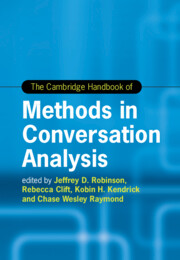Book contents
- Frontmatter
- Contents
- List of Tables
- List of Contributors
- Part I Introduction
- Part II Points of Departure
- Part III Collections
- 8 Working with Collections in Conversation Analysis
- 9 Working with Data II: Clips and Collections
- 10 History of a Collection: Repetition Repairs
- 11 The History of a Collection: Apologies
- 12 Developing a Collection: Coordination of Embodied Conduct with Darf/Kann ich X? ‘May/Can I …?’ in German
- Part IV Evidence
- Part V Avenues into Action
- Part VI Situating and Reporting Findings
- Part VII Looking Forward
- Appendix I Jeffersonian Transcription Conventions
- Appendix II Multimodal Transcription Conventions
- Index
11 - The History of a Collection: Apologies
from Part III - Collections
Published online by Cambridge University Press: 06 December 2024
- Frontmatter
- Contents
- List of Tables
- List of Contributors
- Part I Introduction
- Part II Points of Departure
- Part III Collections
- 8 Working with Collections in Conversation Analysis
- 9 Working with Data II: Clips and Collections
- 10 History of a Collection: Repetition Repairs
- 11 The History of a Collection: Apologies
- 12 Developing a Collection: Coordination of Embodied Conduct with Darf/Kann ich X? ‘May/Can I …?’ in German
- Part IV Evidence
- Part V Avenues into Action
- Part VI Situating and Reporting Findings
- Part VII Looking Forward
- Appendix I Jeffersonian Transcription Conventions
- Appendix II Multimodal Transcription Conventions
- Index
Summary
Making collections of conversational/interactional phenomena is a cornerstone of CA’s methodology. Our aim in CA research is to identify the practices through which speakers of a natural language conduct action in inter-action, the practices that enable speakers to engage in conduct that is meaningful to one another (the accountability-as-intelligibility of social conduct). The practices for talk-in-interaction are recurrent phenomena; they are to be found in recurrent patterns of talk – in recurrent sequential positions or environments, in recurrent sequence patterns, and in recurrent features of turn design such as linguistic format including morphosyntactic constructions. Whilst recurrence may not by itself be a sufficient condition for determining that an object or pattern constitutes a practice, it is a necessary condition. It is necessary to show that an object, pattern etc. works in a particular way systematically – and ‘systematically’ requires recurrence. Thus, the identification, the discovery or uncovering of practices in talk-in-interaction rests on building collections of cases of a phenomenon in order to find whether it is systematically associated with some recurrent pattern. In this chapter I describe the history of one such collection assembled by Gail Jefferson, a collection of apologies that served as the basis for several analyses and publications.
Information
- Type
- Chapter
- Information
- The Cambridge Handbook of Methods in Conversation Analysis , pp. 253 - 275Publisher: Cambridge University PressPrint publication year: 2024
Accessibility standard: Unknown
Why this information is here
This section outlines the accessibility features of this content - including support for screen readers, full keyboard navigation and high-contrast display options. This may not be relevant for you.Accessibility Information
- 1
- Cited by
